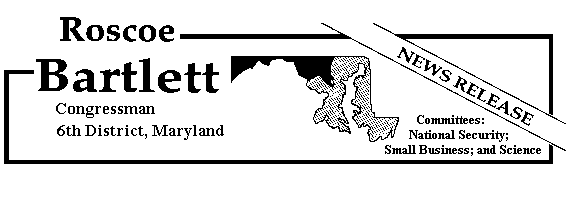
May 3, 2000
202-225-2721
Bartlett Hails House Passage of IDEA Funding
For First Time in 25 Years, Bill authorizes full
funding of federally
mandated programs for disabled students
WASHINGTON- "Passage of this bill is part of the commitment of Republicans to make Washington live up to its promises by ending unfunded federal mandates," said Congressman Roscoe G. Bartlett after voting today to authorize full funding of the federally mandated program for disabled students, the Individuals with Disabilities Education Act (IDEA). Congressman Bartlett said, "This bill will help free up local education resources so school boards, administrators, teachers, and parents can meet the priority needs that they have identified that will most improve the public education of all of our children."
"Twenty-four years ago, Congress made a promise to children and families with special education needs," Bartlett said. "That promise was to provide children with disabilities access to a quality public education by contributing 40 percent of the average per pupil expenditure to assist states and local schools with the extra costs of educating these children."
Since 1975, when IDEA was signed into law, Congress has failed to meet its commitment. During the past four fiscal years, the Republican majority in Congress has increased funding for IDEA by 115 percent, or $2.6 billion, for the federal share in Part B of IDEA. Even with the increase, however, the funding equals only 12.6 percent of the average per pupil expenditure to assist children with disabilities.
The bill, the IDEA Full Funding Act of 2000, H.R. 4055, would authorize increases of $2 billion a year to meet the federal commitment of 40 percent by the year 2010. The Congressional Research Service estimates that more than $15 billion would be needed to fully fund Part B of IDEA. The Fiscal Year 2000 appropriation for IDEA was $4.9 billion, leaving states and school districts with an unfunded mandate of more than $10 billion.
Back to Previous Page